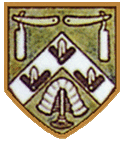
Brief History of the Incorporation
of Barbers of Glasgow
of Barbers of Glasgow
The honourable craft of the
Barber can be traced to the earliest times and the motto of the Glasgow craft,
"Munda hæc vigebat diebus Josephi patriarchæ Jacobi filii, Aegypti
præfecti", translates into English as "This elegant art flourished in
the days of Joseph, son of Jacob the patriarch, Governor of Egypt".
The skill of the Barber's hands enabled another contribution to be made to the wellbeing of the community. The belief in blood-letting as a cure for many ailments created a demand for this service and for centuries the hand which wielded the razor also wielded the lancet. This relationship is still symbolised by the traditional "barber's pole", originally painted white, with a red ribbon bound round and hanging from it a brass "blood-letting" plate or basin - the ribbon for taping off the arm, the pole given to the patient to hold and the basin into which the blood was drained. The relationship between the Barbers and Surgeons was initiated on the basis of a common skill.
The renamed Incorporation of the Chirurgeons and Barbers is unique among the Crafts represented in the Trades House in owing its foundation to a Royal Charter from King James VI in 1599. For some time the two classes of member remained distinct, although the surgeons were more strictly limited than the barbers, who with their chirurgery skills were allowed to perform simple work, healing of wounds, bleeding, extraction of teeth etc.
The Barbers' Charter was ratified by the Scottish Parliament in 1672. However, the profession of surgery eventually fell outwith the trade of the barber and a jurisdictional dispute arose. This was referred to the magistrates who ruled in favour of the Barbers, who were granted permission to elect the Deacon. The quarrel is now well in the past and the Master Court is glad to include in its membership a large number from the medical profession.
The Craft provides for a number of needy pensioners including, by tradition, an annual gift of shortbread. It also donates new books to the library of the Royal College of Surgeons and Physicians as well as an annual prize for the best student in hairdressing at the Glasgow College of Commerce. It elects 4 members of the Trades House and participates in all its work.
The Craft were visited by the Incorporation of Barbers of Basle in 1999 on their 400th anniversary, when they were presented with an illuminated address and stained glass plaque at a commemorative dinner in the City Chambers.
For membership information, please click on the following link.
The skill of the Barber's hands enabled another contribution to be made to the wellbeing of the community. The belief in blood-letting as a cure for many ailments created a demand for this service and for centuries the hand which wielded the razor also wielded the lancet. This relationship is still symbolised by the traditional "barber's pole", originally painted white, with a red ribbon bound round and hanging from it a brass "blood-letting" plate or basin - the ribbon for taping off the arm, the pole given to the patient to hold and the basin into which the blood was drained. The relationship between the Barbers and Surgeons was initiated on the basis of a common skill.
The renamed Incorporation of the Chirurgeons and Barbers is unique among the Crafts represented in the Trades House in owing its foundation to a Royal Charter from King James VI in 1599. For some time the two classes of member remained distinct, although the surgeons were more strictly limited than the barbers, who with their chirurgery skills were allowed to perform simple work, healing of wounds, bleeding, extraction of teeth etc.
The Barbers' Charter was ratified by the Scottish Parliament in 1672. However, the profession of surgery eventually fell outwith the trade of the barber and a jurisdictional dispute arose. This was referred to the magistrates who ruled in favour of the Barbers, who were granted permission to elect the Deacon. The quarrel is now well in the past and the Master Court is glad to include in its membership a large number from the medical profession.
The Craft provides for a number of needy pensioners including, by tradition, an annual gift of shortbread. It also donates new books to the library of the Royal College of Surgeons and Physicians as well as an annual prize for the best student in hairdressing at the Glasgow College of Commerce. It elects 4 members of the Trades House and participates in all its work.
The Craft were visited by the Incorporation of Barbers of Basle in 1999 on their 400th anniversary, when they were presented with an illuminated address and stained glass plaque at a commemorative dinner in the City Chambers.
For membership information, please click on the following link.